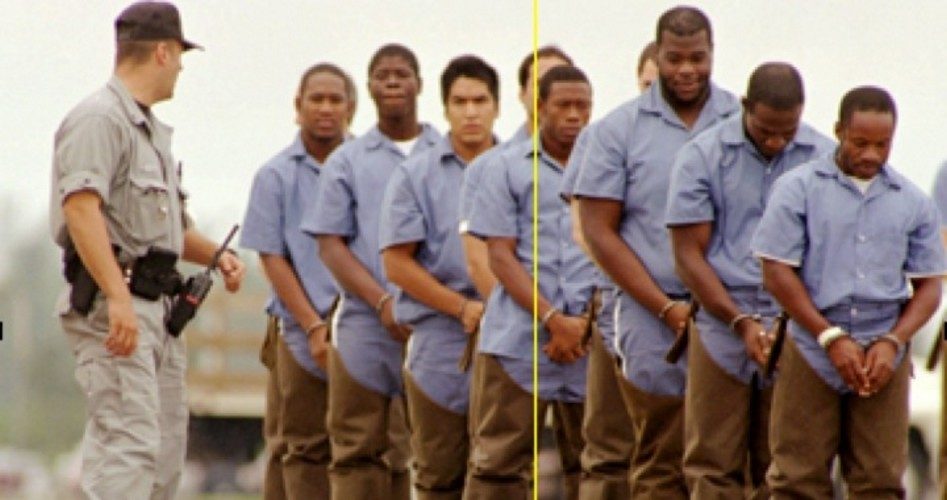
The Obama administration is utilizing the U.S. prison system to help bolster its green-energy agenda, while boosting foreign companies and funneling cash into the hands of Obama’s largest campaign donors, according to a startling new report by the Washington Free Beacon.
Federal Prison Industries, more commonly known as UNICOR, is a wholly owned corporation of the U.S. government that uses penal labor from the Federal Bureau of Prisons to produce various products and services. Established in 1934, the organization was designed as a voluntary vocational-training program for federal prisoners, but has recently gone into business providing green-energy technology to federal agencies.
Federal inmates in Oregon and New York are earning between $.23 and $1.15 per hour building solar panels, which are then sold to a range of government agencies. In rationalizing the program, administration officials say it provides federal agencies with an opportunity to buy solar panels from domestic manufacturers. UNICOR emphasizes this rationale on its website, asserting that its panels “are domestically sourced and produced, meeting the requirements of the Buy American Act, Trade Agreement Act, and the American Recovery and Reinvestment Act.”
However, in 2009 UNICOR entered into a $219-million contract with a Taiwanese company that supplies the solar cells used to build the panels. It’s the typical maneuver to work around the “Buy American” rhetoric, Rep. Bill Huizenga (R-Mich.) charged, because products built using foreign parts are still considered “American-made” as long as they are physically assembled in the United States. “It’s yet another outrage on what is happening with our tax dollars,” Huizenga said in an interview with the Beacon.
One of the more evident problems is that the effort produces virtually no benefit to the private sector, as the parts are foreign-made, and everything is assembled by prison inmates. And if that’s not enough, the law requires that government agencies buy the products from, ironically, the government agency itself.
Officials contend that the effort “prepar[es] inmates for the green economy” and that it “reduces the recidivism rate among prisoners.” However, as the Beacon affirms, a 2011 report by the Congressional Research Service debunks those claims, asserting that they are “not conclusive.”
Further yet, UNICOR has an extensive history of undercutting private enterprise. For example, a military clothing manufacturer with a long history of selling to the Defense Department was recently undercut by UNICOR for a $45-million contract. The company’s CEO, Steven Eisen, said he had to lay off about 100 workers after losing the contract. “Our government screams, howls and yells how the rest of the world is using prisoners or slave labor to manufacture items, and here we take the items right out of the mouths of people who need it,” he charged.
Such practices have become so widespread that Senate Minority Leader Mitch McConnell (R-Ky.) intervened to prevent UNICOR from pirating business from the private sector in his home state.
UNICOR oftentimes partners with private businesses to install the solar panels and assist government agencies in implementing other energy-efficient measures. One prominent beneficiary is Constellation Energy, an energy-efficient supplier that was recently acquired by the Exelon Corporation, a Chicago-based utility company intimately tied to the Obama administration.
Only weeks after the two companies merged, Constellation was awarded a 20-year contract to supply renewable energy to 10 State Department buildings, as well as a segment of the White House campus. In what was called a “first-of-its-kind federal contract,” the effort will help “contribute to President Obama’s executive order to reduce federal-wide greenhouse gas emissions 28 percent by 2020,” according to a press release from the company.
Constellation has secured a market that the bankrupt solar firm Solyndra sought to tap before it filed for bankruptcy late last year, despite raking in a half-billion-dollar, taxpayer-backed loan guarantee from the federal government. Like Solyndra, Constellation collected hundreds of millions of dollars from Obama’s 2009 economic stimulus package.
The firm’s new parent company, Exelon, has become one of the most politically connected companies in the country, and has been a prominent investor in Obama’s campaign endeavors. Company employees, including many top executives, have doled out more than $240,000 to the President since 2007. “Chicago-based Exelon stands out as one of the best patrons throughout Obama’s political career,” Politico recently reported. “Its employees make up the largest group of donors this cycle from the energy and natural resource sector.”
Exelon was the President’s fourth-largest campaign donor during his 2006 Senate run, funneling more than $73,000 to Obama’s campaign. Frank Clark, a retired CEO of another Exelon subsidiary, was an advisor to Obama before his 2008 presidential campaign. The Beacon reported further:
Exelon board member John Rogers has bundled more than $500,000 for the president this cycle, as he did in 2008, and has personally contributed at least $100,000 to the pro-Obama Super PAC Priorities Action. Rogers, who played on the Princeton basketball team with Obama’s brother-in-law, Craig Robinson, recently attended the wedding of senior White House adviser Valeria Jarrett’s daughter in Chicago.
The connections extend well beyond the large campaign contributions of top executives. Obama campaign adviser David Axelrod is a former consultant to the company. Former White House chief of staff Rahm Emanuel helped broker the $8.2-billion merger between PECO Energy and Unicom that led to the firm’s creation in 2000. It was the biggest deal of Emanuel’s two-year career as an investment banker in Chicago, during which he pocketed more than $16.2 million, according to congressional disclosure forms.
All in all, the intimate relationship between the green-energy industry and the Obama White House has been prolific, and UNICOR has been a driving force in forging these two parties together. “Why are we going to use taxpayer dollars to purchase materials that are literally taking business away from the private sector?” Rep. Huizenga asked. “And let’s be honest, let’s pull the pin on the hand grenade. If this was Chinese prison labor, we’d be rejecting every single one of these imports.”
Photo: AP Images



